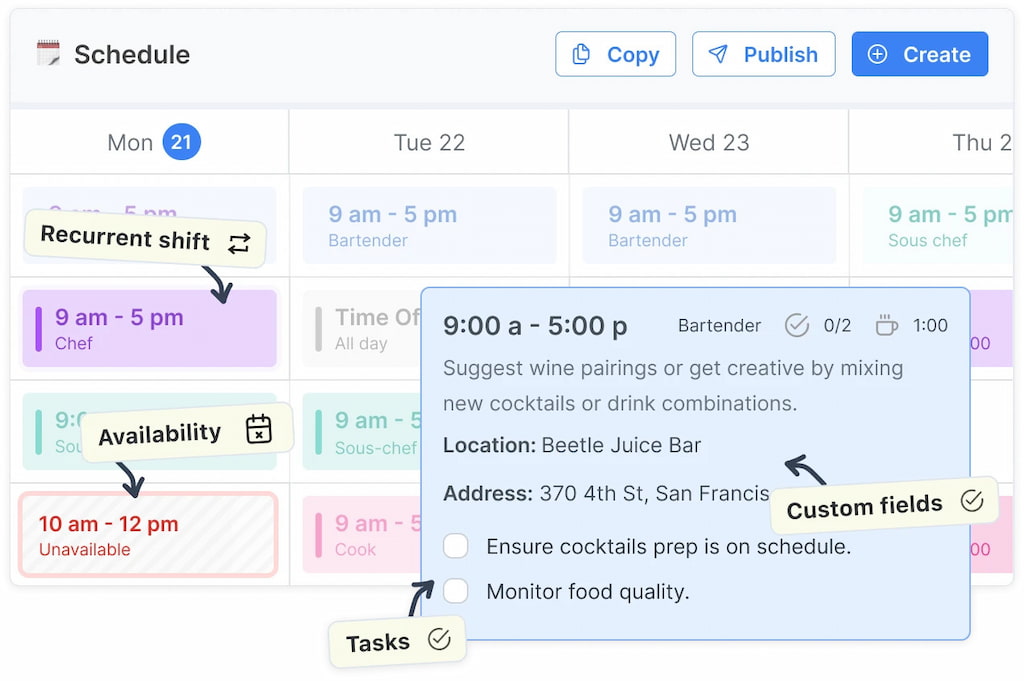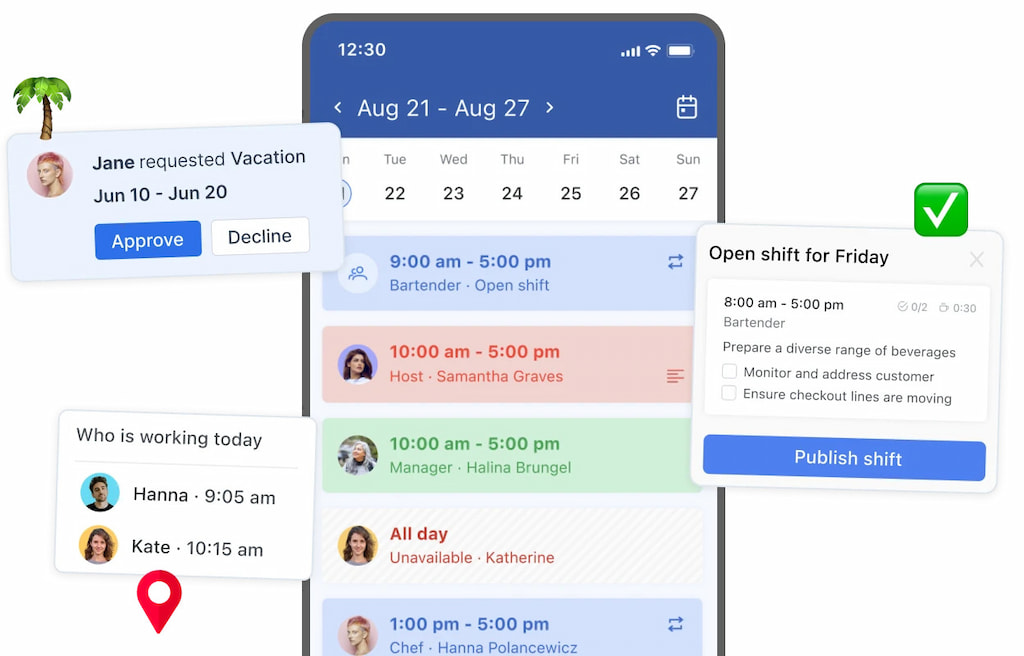Managing a police department schedule is no small feat. Between rotating patrols, emergency callouts, and strict labor regulations, keeping officers in the right place at the right time is a constant challenge. Missed shifts or coverage gaps can impact public safety, morale, and compliance.
That’s where police department scheduling software comes in. Tools like Shifts by Everhour simplify shift planning, track hours, and manage last-minute changes—all in a single, cloud-based platform. In this article, we’ll explore proven scheduling techniques, essential software features, and how free employee shift scheduling apps help police departments streamline operations, reduce administrative headaches, and keep officers focused on the job that matters most.
🚔 What is Police Department Scheduling Software?
Police department scheduling software is designed to simplify the complex task of managing officer shifts, rotations, and coverage. Unlike spreadsheets or basic calendars, it centralizes all scheduling data, reduces errors, and saves time.
Key points
- 📌 Definition and purpose: Automates shift creation, shift swap management, and staffing oversight to ensure proper coverage at all times.
- 🕒 Shift planning: Assign regular, rotating, or custom shifts quickly.
- 🔔 Notifications: Alert officers instantly about changes, emergencies, or overtime.
- 📝 Time tracking: Monitor hours worked and attendance accurately.
- ✅ Compliance monitoring: Stay aligned with labor laws, union agreements, and department policies.
🗂️ Why it’s better than spreadsheets: Eliminates double-bookings, missed shifts, and manual calculations. Updates happen in real time.
With the right software, police departments can maintain operational readiness while keeping officers informed, compliant, and fairly scheduled.
🚨 Core Challenges Police Departments Face
Police departments have unique scheduling demands that can quickly become overwhelming. Key challenges include:
- 🔄 Handling last-minute shift changes and swaps: Officers may need to swap shifts due to emergencies or personal reasons, and managing these changes manually can create confusion.
- 📜 Ensuring compliance with labor laws and union rules: Departments must track hours, rest periods, and agreements to avoid violations.
- ⚖️ Preventing officer burnout and balancing workloads: Fair distribution of shifts is crucial to keep morale high and maintain safety.
- 🌐 Coordinating multi-unit teams and multi-location coverage: Scheduling across precincts or specialized units adds complexity that traditional spreadsheets can’t handle.
Addressing these challenges is easier with software that automates notifications, tracks hours, and provides full visibility into coverage.
🛠️ Key Features of the Best Software
When evaluating scheduling software for your department, these features can make a big difference:
- 📅 Custom shift patterns and recurring templates: Accommodate 24/48 rotations, night shifts, or hybrid schedules with reusable templates.
- 🔔 Real-time notifications and alerts: Instantly inform officers about shift changes, swaps, or emergency callouts.
- 🎖️ Certification and qualification tracking: Ensure every shift is covered by officers with the required skills and training.
- ⏱️ Time tracking and payroll integration: Monitor hours worked and streamline payroll processing to save time and maintain accuracy.
- 🚨 Emergency callout functionality: Quickly alert off-duty personnel for urgent response situations.
- 📊 Reporting and analytics for staffing and labor costs: Gain insights into overtime, coverage gaps, and budget impact for better decision-making.
🔨 Police Department Scheduling Software Breakdown
| Software | Key Features | Pricing | Ideal For |
|---|---|---|---|
| Shifts by Everhour | Drag‑and‑drop scheduling, time tracking, mobile self‑service, reporting & analytics | Free tier + scalable paid plans | Departments of any size needing full‑featured scheduling + tracking |
| Hero Schedule | 24/48 and patterned rotations, open shift pool, minimum staffing, overtime alerts | From ~$4‑6/user/month | Police, fire & EMS agencies with complex rotation needs |
| Aladtec | Shift scheduling, time-off requests, messaging, duty assignments, compliance tracking | From ~$4.50/user/month | Agencies requiring highly customizable shift patterns and certifications |
| Schedule Anywhere | Real-time scheduling, multi-location support, alerts, compliance reports | Contact for pricing | Multi-unit departments needing centralized scheduling control |
| Deputy | Shift planning, AI forecasting, mobile scheduling, labor compliance checks | From ~$4/user/month | Departments with multiple locations and compliance requirements |
| When I Work | Shift templates, mobile app, swap shifts, time tracking | From ~$2/user/month | Smaller police units or teams needing flexibility and mobile access |
| VCS Police Scheduling | Automatic shift rotations, officer availability tracking, reporting | From ~$5/user/month | Departments using standard patrol rotations or complex schedules |
| Frontline Scheduler | Multi-unit coordination, shift swaps, notifications, compliance alerts | From ~$3.50/user/month | Medium to large police departments managing multiple units |
| InTime | Custom shift patterns, emergency callouts, certification tracking, reporting | From ~$6/user/month | Police, fire, and EMS agencies with critical readiness requirements |
Fire department scheduling software, police scheduling apps, and security guard scheduling software often overlap, so be sure to check the former out!
🔵 How Shifts by Everhour Helps Police Departments
Managing officer schedules can be complex. Between last-minute callouts, multi-unit coverage, and ensuring fairness, supervisors need a system that keeps everything in sync. Shifts by Everhour makes scheduling simple, fast, and reliable.
- 🕒 Real-time scheduling updates – See who’s on duty, off, or available instantly, avoiding coverage gaps.

- ⚡ Quick shift adjustments – Handle sick calls, training, or special events in seconds, with notifications sent directly to officers.
- 📱 Mobile access for officers – Check shifts, volunteer for extra duty, or swap with a colleague without endless texts.

- 🔔 Conflict alerts – The system flags overlapping shifts or missing coverage so supervisors can fix issues before they become problems.
- 📊 Visibility into workloads – Track hours, overtime, and assignments to distribute shifts fairly and prevent burnout.
With Shifts by Everhour, police departments can move from chaotic spreadsheets to organized, clear schedules—keeping officers informed, prepared, and mission-ready.
❓ FAQ: Police Department Scheduling Software
What is police department scheduling software?
It’s a tool that helps departments plan, manage, and track officer shifts, rotations, and availability in one centralized platform.
How does it improve over spreadsheets?
It eliminates double-bookings, automates shift swaps, tracks hours, and provides real-time notifications—reducing errors and saving time.
Can it handle emergency callouts?
Yes. Most software, like Shifts by Everhour, allows instant alerts for off-duty officers to ensure rapid deployment.
Does it track certifications and qualifications?
Absolutely. It ensures only qualified officers are assigned to specific roles or shifts.
Can it help with labor law compliance?
Yes. The software tracks hours, overtime, and union rules to keep scheduling aligned with legal and policy requirements.
Is mobile access available?
Most platforms provide mobile apps so officers can check schedules, request swaps, or clock in from their phones.
Which departments benefit most?
Departments of all sizes—from small precincts to large multi-unit agencies—benefit from streamlined scheduling and improved operational readiness.
How does Shifts by Everhour help?
It combines shift scheduling, time tracking, real-time alerts, and reporting in one system, making scheduling easier and more transparent.
🔎Final Notes
Effective scheduling is the backbone of any police department. From ensuring coverage across shifts to preventing officer burnout, the right system makes all the difference. By adopting modern tools like Shifts by Everhour, departments can streamline shift management, respond quickly to last-minute changes, and maintain fairness across teams.
Scheduling software doesn’t just save time—it improves communication, keeps officers informed, and helps supervisors focus on operations rather than paperwork. Whether you’re managing a single precinct or multiple units, smart scheduling ensures your department stays organized, compliant, and ready for action.
If managing officer schedules has become overwhelming, it may be time to consider Shifts by Everhour as the best police department adaptive scheduling software.
Learn about the benefits of employee scheduling to leverage it even more!

